Meet Your Professors
Dr. Andrew arnold - constitutional & worker/Labor Studies
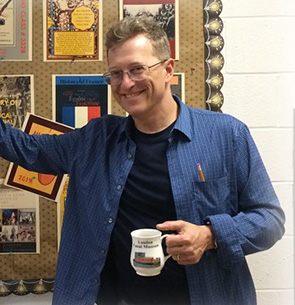
-
Q: Why are you drawn to teaching the US Constitution?
"It’s a topic that touches on every aspect of American history and society, and no one wonders whether or not it’s important. It’s a class where it is very easy for students to take a very general topic and bend it in whatever direction they’d like. Then it’s my job to pull it together and see how it relates back to the main topic."
-
Q: What approach do you take in helping students write more effectively?
“Normally, in the computer age, you get an assignment and start writing. You get warmed up, write to the word limit, and then tie it up with a bow and send it out. That's a very stressful way to write because it forces you to get everything right the first time. My way is to help students find what process works best for them by giving them many points of reflection in drafts. I just ask them what they want to write about and then, after they’re done explaining, I tell them what I think their topic is. Then, they usually want to try again. Each time, ideas and connections come out differently. Every time an idea changes form, it gets richer. The more drafts I can help students write, the more surprised and interested they are by what they come up with.”
-
Q: You like to walk or ebike to work - why is that?
"There's a serendipity to walking/pedaling around and bumping into other people that’s irreplaceable. In just bumping into people, you renew your humanity and theirs."
-
Q: What’s your favorite memory of London while teaching study abroad classes there?
"The single most interesting thing was going to the National Archives just outside of London.
The thing I think was the most wonderful is that to get to the national archive, you take a double decker bus, and you get out and see the massive steam engines, walk across an old stone bridge and along an old stone path until you come to a little simple garden gate, and there you are. They give you your scholar card and you can ask for anything they have, and they’ll just give it to you.
Then you look up anything you want to. We looked at Princess Elizabeth's letters. That's Princess Elizabeth before she became Queen Elizabeth. We unrolled proclamations from the 1600s and these little stamps about the size of your fingernail came flying off. These show that these scrolls had paid the stamp tax. We held letters that Ben Franklin wrote to the crown. They're in his handwriting; he wrote them, he held them, he folded them! In America, they'd be behind argon, or they would be microfilmed. So, you get to handle things of such antiquity and you get treated like a serious scholar. I had a student who held the account books for the Knights Templar from the 11th century and just the look on her face of like, “I'm holding this!” and she ended up studying Latin translation at the University of Kent probably because of that very experience."
-
Q: What is your teaching philosophy?
"My goal is to foster student interest and agency. I want students to have permission to explore the parts of history they find the most interesting, and I will meet them at their topics."
-
Q: Where is your favorite place to travel?
"My favorite place is actually one I have never been to before because my favorite way to travel is to visit somewhere new."
Dr. Eric Johnson - Early Modern Studies
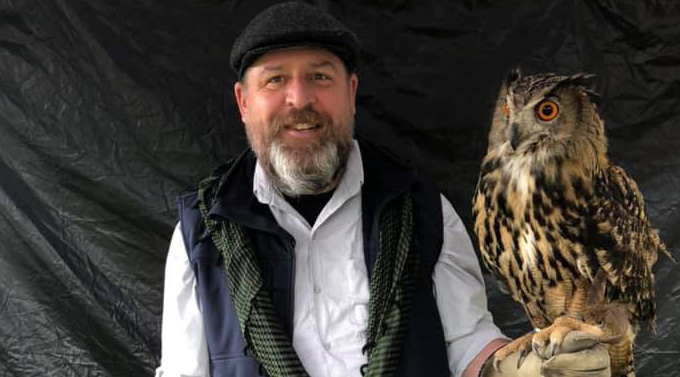
-
Q: - Tell us about your study abroad adventures in Ireland
“I think the most important aspect of it is that the majority of students are travelling overseas for the first time. Travel is the best education. They get more out of those thirty days than at least two years of undergraduate education on campus. I have memories of my first serious trip overseas, and I feel like this is an opportunity to give back in the form of an experience for others.”
-
Q: Why did you choose history as your field?
“I always had plans to eventually get a bachelor’s degree. Even wanting to get a career in law enforcement, my intention was to have a bachelor’s degree for it. That being said, I have always been interested in the past. As a kid, I thought I wanted to be an archeologist. I was most interested in European archeology, the European past, and especially the middle ages. I remember as a really small kid, my parents took me to the King Tutankhamun exhibit, and I was always obsessed with mummies, Egypt, and just old things in general. I realized that the best way for me to work with the material that I wanted to work with was to do history.”
-
Q: What is your favorite part of being on the KU History faculty?
“I was a first-generation graduate and I’m working with a lot of first-generation students who, like me, do not come from very affluent backgrounds. I remember my own struggles getting through and I feel like I am where I can connect the most and share my experiences.”
-
Q: What are some parts of your career that you are most proud of?
“I won a Fulbright scholarship in 2000-01.
I have a few articles that have been published in some of the most prestigious journals in my field.
But I would say my greatest achievement is my students who have gone on and accomplished great things on their own. I have had a number of former students go to grad school and earn their doctorate, and many of them are now teaching themselves.”
-
Q: What led you to teach?
“I developed a strong intellectual curiosity for history and academia seemed like the best way to pursue that interest. I’ve been very surprised at how I enjoy teaching much more than I ever thought I would.”
Dr. Michael Gambone - latin american studies
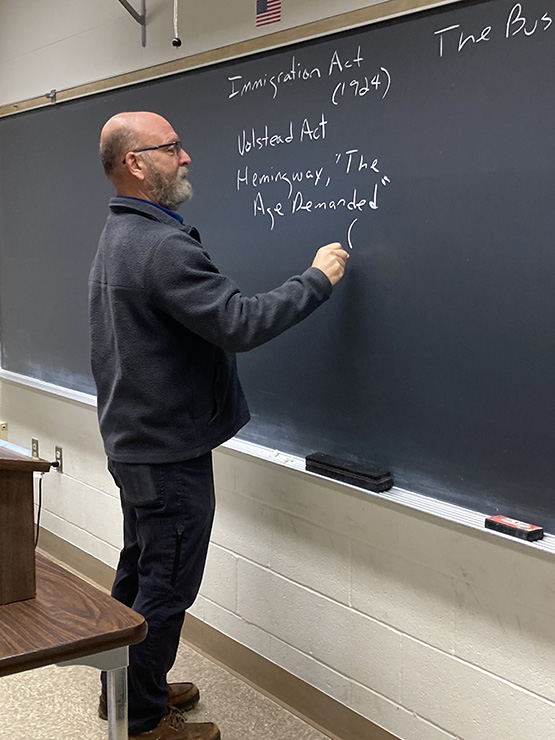
-
Q: Why Latin American History?
“When I was stationed at Ft. Bragg, our area of responsibility included Nicaragua. After my discharge from the service, I wanted to learn more about where I might be deployed, so I applied what I learned about Vietnam to Nicaragua.”
-
Q: Why a class on conspiracies?
“One of my old Penn State professors discussed it with me, and it started out as kind of a lark. I had no idea how the class would turn out like it did or that I would even write a book on it. I think people take that class for different reasons, but that doesn’t change how attractive it is. I also think people take it because it gives them a space to talk about a subject that isn’t really talked about anywhere else.”
-
Q: What makes the KU History Department special?
”It is embedded in the department that the student always comes first. It's just an unwritten rule that everyone holds to. And I like that.”
-
Q: What is your teaching philosophy?
“Take your work seriously but not yourself. “
-
Q: What country would you like to visit?
“Vietnam. I’ve always considered getting a degree in English as a second language so I can teach in the summer, and I would enjoy teaching there.”
DR. JOHN STANLEY - EAST ASIAN STUDIES
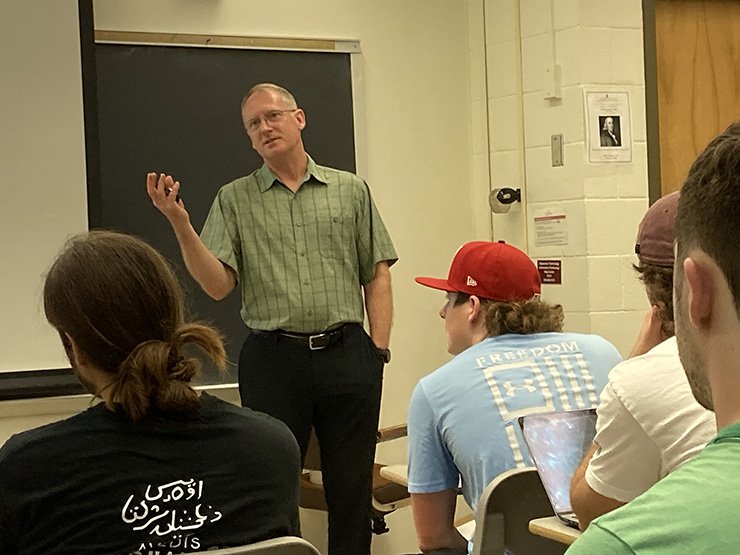
-
What originally piqued your interest in East Asian Studies?
I really became interested when I went to the Weixian internment camp for the first time in 1991. My grandfather was studying in Beijing when he met my grandmother and was taken to the camp, so I wanted to learn more about my family and about what the camp was like. I also wanted to understand what it was like when the location was an American Presbyterian mission station with a sign that read "Courtyard of the Happy Way."
-
How is an British education/university different than one in the US?
I attended the School of Oriental and African Studies (University of London), and one of the biggest differences was the emphasis on exams. It made up 50-70% of your grade, so you needed to pass them to pass the course. The other big difference was that when you apply to the PhD program, you apply with a very specific project and then work on it without the requirement of further exams. The disadvantage for the British system is that you aren't encouraged to do presentations or market yourself when I was there. The focus was on getting the dissertation done.
-
Favorite subject in your field?
Taiping Rebellion! Largely because it was connected to Christianity and the foreign missionaries. In class we get to talk about Christianity entering China and then Hong Xiuquan (the rebellion's leader) believing he was the Chinese son of a god. I also like to talk about peasant rebellions and rebellions against the state more generally because you are not only studying these rebellions against power but also the effect of society on their development.
-
What led you to teach?
First, I decided to study China. I was working at the Electrochemical Society of Pennington, NJ and had the opportunity to do my masters in England. While there, I met some old internees from internment camps in China. One of the professors in the History Department was interested in missionaries so I began looking at them more closely and began to study internment camps. Although there are many paths you can take after a PhD, I liked to interact with people so I took the teaching route.
DR. CHRIS SAIDI - AFRICAN STUDIES
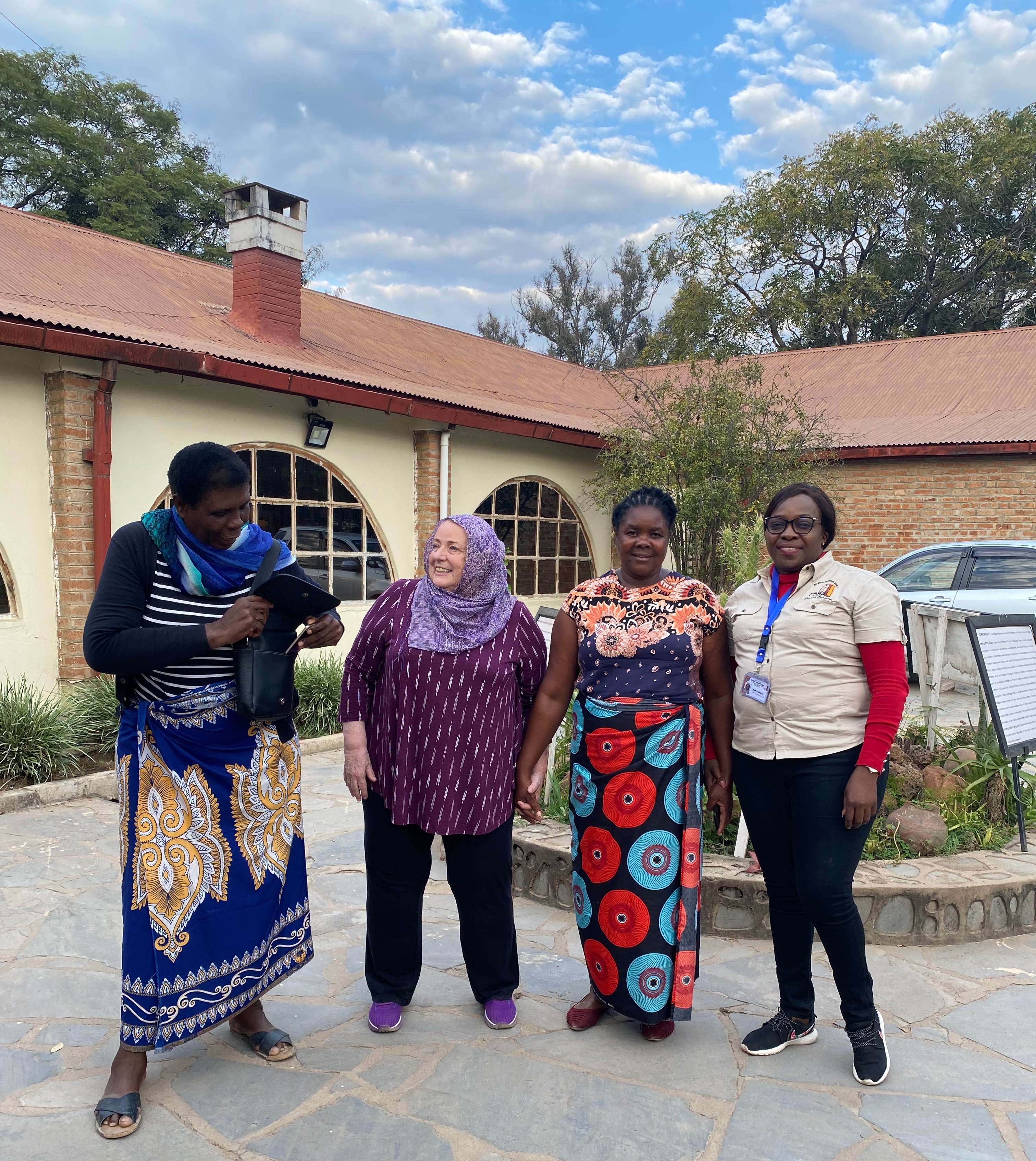
-
Q: What caused you to specialize in African History?
I took a course at UCLA on early South African history taught by Dr. Christopher Ehret and I was hooked!
-
Q: Geographically, how much of the world have you seen?
I lived for a year each in Seoul, South Korea; Rome, Italy and Zambia. I have visited far more places including, Japan, Somalia, Kenya, Democratic Republic of Congo, France, England, Belgium, and the Netherlands. Make sure that you take the time to explore too!
-
Q: Why do you encourage KU students to attend grad school after completing their degree?
If you really have a passion for a subject, grad school will be the best and most wonderful time of your life. You live and breathe the subject; you make friends for life who care about the same subject.
-
Q: What is matrilineality?
Matrilineality is when your identity and inheritance is from your mother exclusively. In these societies, especially in Africa, authority and status are determined by age instead of biological sex. To marry, a young man must agree to work for his mother-in-law for years before the marriage is sanctioned. This means that older women often control much of the labor in an African matrilinieal community. But most matrilineal societies foster an attitude of gender equity. If you want to know more -- take a class with me!!
-
Q: What do you want KU students to know about the possibilities of life?
If you put the effort in - you will be successful. I started out as a 23-year-old single mom of two, who worked all day and went to community college at night. I struggled a lot to achieve my education. But for me, it was worth it! I love doing research on early African history and teaching students about Africa.
DR. Michael Gabriel - Early American History
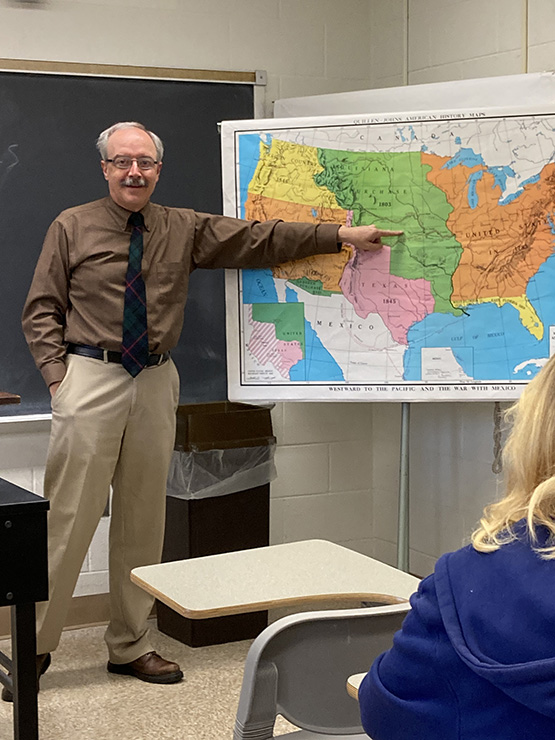
-
Q: What do you think are important qualities for a professor to be successful reaching students?
“Know what you’re talking about. You have to be organized and have some kind of plan of what to get done on a given day. You also have to pay attention to the students and make sure they ask questions and stay engaged."
-
Q: What draws students into History classes?
"Students frequently like war histories, like WWII and the Civil War. I'm not sure why, but whenever I ask students why they take certain history classes, they'll say because of the battles or war stories. Another thing that draws people in are social issues."
-
Q: What are some of your greatest academic accomplishments?
“I received the David Library of the American Revolution Research Fellowship while researching pension records for the Battle of Bennington. I also received the Arthur and Isabel Wiesenberger Faculty Award for Excellence in Teaching which is given by alumni at KU."
-
Q: Is there anything you would like the students to know?
“I want students to know that it is okay to change your mind. You do not have to have your whole life planned out. Do not stick with a career path that you hate. I ended up pursuing my passion for history, and everything worked out. I am glad that I chose history because I am doing what I love. I think Kutztown is a good place to be!”
-
Q: Could you tell us something about the works you’ve published?
“I’ve have published five books. One is a compilation of letters and photos from WWII called, “Physician Soldier: The South Pacific Letters of Captain Fred Gabriel from the 39th Station Hospital." My latest book which will be published soon called, “The Canadian Campaign, 1775-1776” is part of a series being published by the US Army.”
DR. ROBERT REYNOLDS - PA HISTORY, ENVIRONMENTAL & MORE
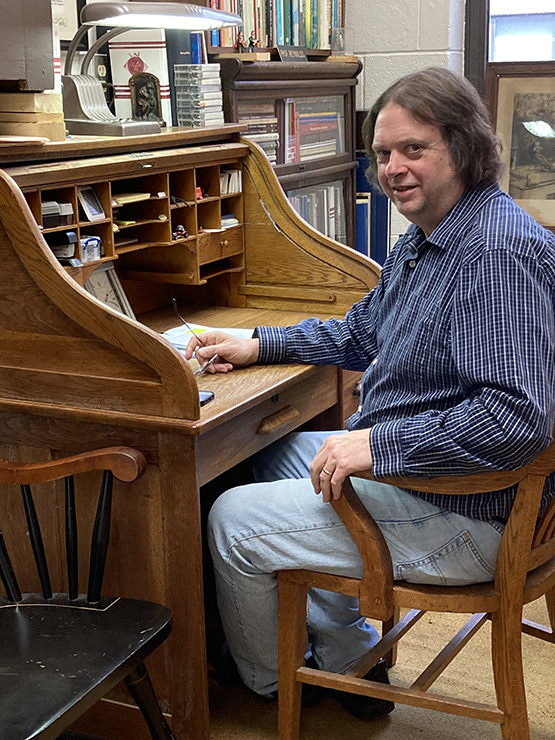
-
Q: - How did your teaching career begin?
“I was working at a nonprofit historic preservation organization and an elderly person who was going to teach an architect course at a college hired me to teach the course right before the semester started. I had another full-time job at the time, but after the full semester, the department chair really liked my work and offered me a part time job teaching American history. From there I went to get my PhD at Lehigh and continued with my career.”
-
Q: What approach do you take in helping students write more effectively?
“It’s not enough to have good ideas or good details, it’s the connecting part that’s the most important. That’s the part that students need the most help with."
-
Q: - How have your personal experiences affected your teaching?
“My daughter came here, and I convinced her to take a history minor. She took a handful of my classes and afterwards we sat down and discussed what she thought of the courses she had taken. I changed my style of teaching because then instead of teaching as a professor, I began teaching as a parent, and it made me a much better teacher. Now, it doesn’t feel like I’m just giving grades, but I’m trying to set more reasonable goals to help students achieve more than just the grades."
-
Q: What's the story behind the retro furniture in your office?
“I have always lived in retro houses. I have a 1908 rustic bungalow and have a life right to an 18th century stone house in Maxatawny which I look after. I wanted an office that had the same vibe and the furniture that the university provided just didn’t have that. So, I brought my own stuff in.”
-
Q: Can you tell us about the book that you are writing?
“American Rustic is my book’s title, and I want to change the way we define rustic. Right now, the word is used to put down simple and “rustic” people. Rustic was actually the name for a movement where many city people moved out to cabins in the wilderness. They made summer colonies on lakes with simple frame bungalows which were made to blend into the landscape to maintain the beauty of nature. The city people did this to simplify their lives, and nature was put ahead of man’s needs sympathetically to preserve it. In my book, I am attempting to redefine rustic as the moment of creativity when nature inspired an aesthetic."
Dr. Patricia Kelleher - American Social History
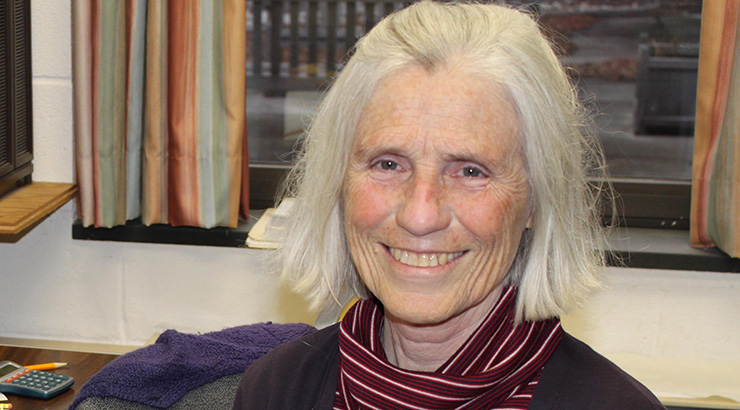
-
Q: What made you choose history?
“My parents, but especially my father was interested in history. My house was full of books, and I loved to read. My parents really tried to help me find my talent. I tried ballet, swimming, piano lessons, but I was much more interested in reading. I found that the more I read about history, the more I wanted to learn about history. By 7th or 8th grade, I was extremely fascinated with history.”
-
Q: What is your favorite area?
“It changes all the time. Right now, I am most interested in gender studies. I love teaching all of my classes because they are so different from one another. However, I am really drawn to my Families and Personal Lives in American History course at the moment because it is only my second time teaching this course. It’s a new challenge that I am really enjoying.”
-
Q: Do you have a teaching philosophy?
“I think that my philosophy of teaching is centered around students thinking for themselves. I want students to work on their own views by basing their analyses on creditable evidence. I want students to respect themselves by coming up with their own answers to inquiries.”
-
Q: What is your favorite part about being a history professor at KU?
“My favorite part is definitely the teaching aspect. This year, in particular, I have found that I also enjoy learning about new courses for the university. I am on the Liberal Arts and Sciences Curriculum Committee, and so I see the course proposals that are generated in this college’s departments. It is fun to see professors put together courses in ways that I wouldn’t have thought of. I have really grown in respect for what goes on across the college. There are some truly thoughtful and amazing course proposals. We have fantastic faculty members that are putting together remarkable courses.”






